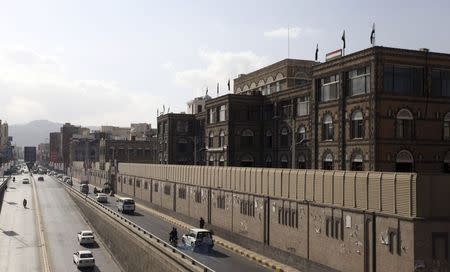Gunmen hold Yemeni official to try to derail new constitution
By Mohammed Ghobari SANAA (Reuters) - Yemen's Houthi militia seized a top official on Saturday and threatened unspecified further steps to derail a proposed new constitution in a wrangle for power that threatens to bring down the government, raising fears al Qaeda could benefit. The draft constitution, formally launched on Saturday, aims to resolve big regional, political and sectarian differences in Yemen by devolving authority to regions, but has been bitterly opposed by the Houthis who fear it will dilute their power. Western and Gulf Arab countries worry about insecurity in Yemen because of its border with top oil exporter Saudi Arabia and presence of an al Qaeda wing that has claimed responsibility for the attack on Charlie Hebdo newspaper in Paris. However, political chaos has accelerated since the Houthis, who demand more rights for the country's Zaydi Shi'ite Muslim sect, seized Sanaa in September and advanced into central and western areas where Sunni Muslims predominate. The group said its gunmen "arrested" Ahmed Awad bin Mubarak, office director for President Abd-Rabbu Mansour Hadi and a former nominee for prime minister, early on Saturday to stop him attending a meeting on the constitution. In its statement on the al-Maseerah television channel, the militia said it had become aware of what it called irregularities in both the draft constitution and how the government was attempting to make it law. Houthi representatives also pulled out of a meeting with Hadi and the country's other main political and regional factions to discuss the constitution, two attendees at the meeting told Reuters. The new charter is the result of talks between Yemen's competing factions aimed at smoothing a political transition triggered by the departure of former leader Ali Abdullah Saleh who stepped down in 2012 after a year of street protests. However, its proposal to divide Yemen into six federal regions is opposed by the Houthis, now the strongest group in the country, who instead support a plan by southern separatists for just two regions. A powerful group of tribes backed by Saleh's party, the General People's Congress has also rejected the six-region plan, and urged the country instead be divided into much smaller governorates, analysts say. The General People's Congress, also walked out of Saturday's meeting on the draft of the constitution, the attendees said. Scores of people have already been killed in 2015 by al Qaeda attacks and clashes between the Houthis and Sunni militants and tribesmen. (Writing by Angus McDowall; Editing by Alison Williams)



